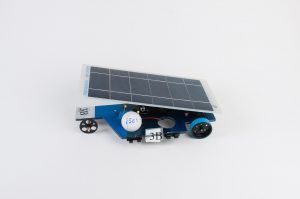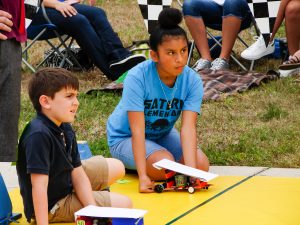Junior Solar Sprint
Green Division (Grades 3 – 5)
Best Design
1st Place – The Limo – Pine Crest School (Ft. Lauderdale)
Teacher – Kris Swanson
2nd Place – The PC Mobile – Pine Crest School (Ft. Lauderdale)
Teacher – Kris Swanson
3rd Place – HELIOS – The Bonds – NSU University School (Ft. Lauderdale)
Teacher – Michele Murray-Garren
Most Innovative
1st Place – The Limo – Pine Crest School (Ft. Lauderdale)
Teacher – Kris Swanson
2nd Place – Ocean Odyssey – Buck Lake Elementary (Tallahassee)
Teacher – Kim Perez
3rd Place – Mordor – Buck Lake Elementary (Tallahassee)
Teacher – Kim Perez
Race
1st Place – Sun Runners – Orlando Science (Orlando)
Teacher – Amy Trujillo
2nd Place – The Bonds – NSU University School (Ft. Lauderdale)
Teacher – Michele Murray-Garren
3rd Place – The Lightning Sharks – NSU University School (Ft. Lauderdale)
Teacher – Michele Murray-Garren
Blue Division (Grades 6 – 8)
Best Design
1st Place – The Rovers – Parkland STEM Club (Plantation)
Teacher – John Garren
2nd Place – The Milwee Falcons – Milwee Middle (Longwood)
Teacher – Carol Unterreiner
3rd Place – Meowzster – Cornerstone Learning Community (Tallahassee)
Teacher – Karen Metcalf
Most Innovative
1st Place – Panther Engineering G8 – Pine Crest School (Ft. Lauderdale)
Teacher – Kris Swanson
2nd Place – The Rovers – Parkland STEM Club (Plantation)
Teacher – John Garren
3rd Place – Meowzster – Cornerstone Learning Community (Tallahassee)
Teacher – Karen Metcalf
Race
1st Place – The Rovers – Parkland STEM Club (Plantation)
Teacher – John Garren
2nd Place – Meowzster – Cornerstone Learning Community (Tallahassee)
Teacher – Karen Metcalf
3rd Place – The Milwee Falcons – Milwee Middle (Longwood)
Teacher – Carol Unterreiner


